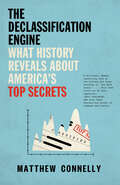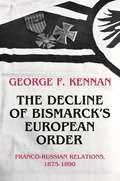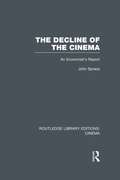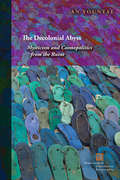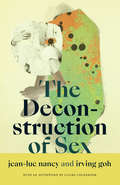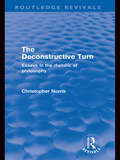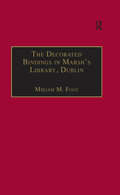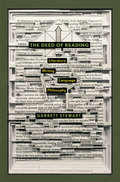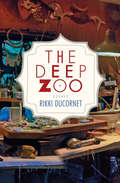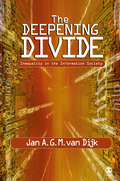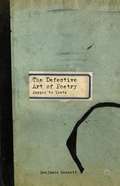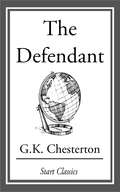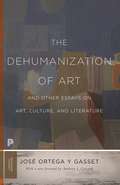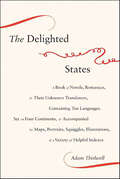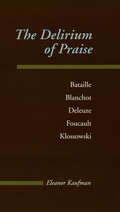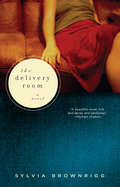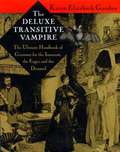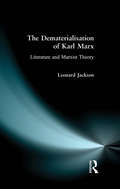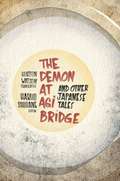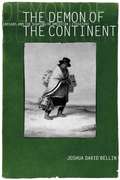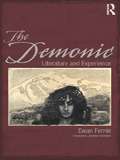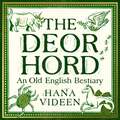- Table View
- List View
The Declassification Engine: What History Reveals About America's Top Secrets
by Matthew ConnellySHORTLISTED FOR THE CUNDHILL HISTORY PRIZE • Every day, thousands of new secrets are created by the United States government. What is all this secrecy really for? And whom does it benefit?&“A brilliant, deeply unsettling look at the history and inner workings of &‘the dark state'.... At a time when federal agencies are increasingly classifying or destroying documents with historical significance, this book could not be more important.&” —Eric Schlosser, New York Times best-selling author of Command and ControlBefore World War II, transparent government was a proud tradition in the United States. In all but the most serious of circumstances, classification, covert operations, and spying were considered deeply un-American. But after the war, the power to decide what could be kept secret proved too tempting to give up. Since then, we have radically departed from that open tradition, allowing intelligence agencies, black sites, and classified laboratories to grow unchecked. Officials insist that only secrecy can keep us safe, but its true costs have gone unacknowledged for too long. Using the latest techniques in data science, historian Matthew Connelly analyzes a vast trove of state secrets to unearth not only what the government really did not want us to know but also why they didn&’t want us to know it. Culling this research and carefully examining a series of pivotal moments in recent history, from Pearl Harbor to drone warfare, Connelly sheds light on the drivers of state secrecy— especially incompetence and criminality—and how rampant overclassification makes it impossible to protect truly vital information. What results is an astonishing study of power: of the greed it enables, of the negligence it protects, and of what we lose as citizens when our leaders cannot be held to account. A crucial examination of the self-defeating nature of secrecy and the dire state of our nation&’s archives, The Declassification Engine is a powerful reminder of the importance of preserving the past so that we may secure our future.
The Decline and Fall of the Lettered City: Latin America in the Cold War (Convergences: Inventories of the Present #24)
by Jean FrancoThe cultural Cold War in Latin America was waged as a war of values--artistic freedom versus communitarianism, Western values versus national cultures, the autonomy of art versus a commitment to liberation struggles--and at a time when the prestige of literature had never been higher. The projects of the historic avant-garde were revitalized by an anti-capitalist ethos and envisaged as the opposite of the republican state. The Decline and Fall of the Lettered City charts the conflicting universals of this period, the clash between avant-garde and political vanguard. This was also a twilight of literature at the threshold of the great cultural revolution of the seventies and eighties, a revolution to which the Cold War indirectly contributed. In the eighties, civil war and military rule, together with the rapid development of mass culture and communication empires, changed the political and cultural map. A long-awaited work by an eminent Latin Americanist widely read throughout the world, this book will prove indispensable to anyone hoping to understand Latin American literature and society. Jean Franco guides the reader across minefields of cultural debate and histories of highly polarized struggle. Focusing on literary texts by García Marquez, Vargas Llosa, Roa Bastos, and Juan Carlos Onetti, conducting us through this contested history with the authority of an eyewitness, Franco gives us an engaging overview as involving as it is moving.
The Decline of Bismarck's European Order: Franco-Russian Relations 1875-1890
by George Frost KennanIn an attempt to discover some of the underlying origins of World War I, the eminent diplomat and writer George Kennan focuses on a small sector of offstage events to show how they affected the drama at large long before the war even began. In the introduction to his book George Kennan tells us, "I came to see World War I . . . as the great seminal catastrophe of this century--the event which . . . lay at the heart of the failure and decline of this Western civilization." But, he asks, who could help being struck by the contrast between this apocalyptic result and the "delirious euphoria" of the crowds on the streets of Europe at the outbreak of war in 1914! "Were we not," he suggests, "in the face of some monstrous miscalculation--some pervasive failure to read correctly the outward indicators of one's own situation?" It is from this perspective that Mr. Kennan launches a "micro-history" of the Franco-Russian relationship as far back as the 1870s in an effort to determine the motives that led people "to wander so blindly" into the horrors of the First World War.
The Decline of the Cinema: An Economist’s Report (Routledge Library Editions: Cinema)
by John SpraosBetween 1952 and 1962, when this book was originally published, the number of people visiting British cinemas had fallen by nearly two thirds and was little more than half the pre-war total. Nearly 1500 of the 4500 cinemas functioning in 1955 had closed five years later, and the author here predicts a further substantial fall. The causes of this drastic decline are traced to the competition of television but also to the dramatic halving of the number of new American films and to the difficulty of transferring a cinema’s ‘congregation’ when it is closed. This decline has few parallels in recent times and in conjunction with a disproportionate and unexpected increase in the price of seats presents a fascinating study for the economist, which the author fully exploits. But the film industry is of general interest so that the author’s conclusions and his social recommendations will appeal to the general reader as well as those in the industry.
The Decolonial Abyss: Mysticism and Cosmopolitics from the Ruins (Perspectives in Continental Philosophy)
by An YountaeThe Decolonial Abyss probes the ethico-political possibility harbored in Western philosophical and theological thought for addressing the collective experience of suffering, socio-political trauma, and colonial violence. In order to do so, it builds a constructive and coherent thematization of the somewhat obscurely defined and underexplored mystical figure of the abyss as it occurs in Neoplatonic mysticism, German Idealism, and Afro-Caribbean philosophy.The central question An Yountae raises is, How do we mediate the mystical abyss of theology/philosophy and the abyss of socio-political trauma engulfing the colonial subject? What would theopoetics look like in the context where poetics is the means of resistance and survival? This book seeks to answer these questions by examining the abyss as the dialectical process in which the self’s dispossession before the encounter with its own finitude is followed by the rediscovery or reconstruction of the self.
The Deconstruction of Sex (a Cultural Politics book)
by Jean-Luc Nancy Irving GohIn The Deconstruction of Sex, Jean-Luc Nancy and Irving Goh discuss how a deconstructive approach to sex helps us negotiate discourses about sex and foster a better understanding of how sex complicates our everyday existence in the age of #MeToo. Throughout their conversation, Nancy and Goh engage with topics ranging from relation, penetration, and subjection to touch, erotics, and jouissance. They show how despite its entrenchment in social norms and centrality to our being-in-the-world, sex lacks a clearly defined essence. At the same time, they point to the potentiality of literature to inscribe the senses of sex. In so doing, Nancy and Goh prompt us to reconsider our relations with ourselves and others through sex in more sensitive, respectful, and humble ways without bracketing the troubling aspects of sex.
The Deconstructive Turn: Essays in the Rhetoric of Philosophy (Routledge Revivals)
by Christopher NorrisWhat might be the outcome for philosophy if its texts were subjected to the powerful techniques of rhetorical close-reading developed by current deconstructionist literary critics? When first published in 1983, Christopher Norris’ book was the first to explore such questions in the context of modern analytic and linguistic philosophy, opening up a new and challenging dimension of inter-disciplinary study and creating a fresh and productive dialogue between philosophy and literary theory.
The Decorated Bindings in Marsh's Library, Dublin
by Mirjam M. FootAmong the many books in original bindings in Marsh's Library, Dublin, a surprisingly large number are in decorated blind- or gold-tooled, calf, pigskin or goatskin bindings, which date from the 15th to the 19th centuries. The bindings come from all over Europe, ranging from Ireland to eastern Europe. While most were made in England, some fine and interesting examples from Germany, Italy, France, Spain and Holland are also included. In this volume, leading scholar Mirjam Foot first gives an overview of how books were bound by hand and then describes the bindings by country of origin, within each section treating them chronologically and by type of decoration. The detailed descriptions of the bindings are illustrated with 52 black and white photos and 8 colour plates.
The Deed of Reading: Literature * Writing * Language * Philosophy
by Garrett StewartGarrett Stewart begins The Deed of Reading with a memory of his first hesitant confrontation, as a teenager, with poetic density. In that early verbal challenge he finds one driving force of literature: to make language young again in its surprise, coming alive in each new event of reading. But what exactly happens in the textual encounter to make literary phrasing resonate so deeply with readers?To take the measure of literary writing, The Deed of Reading convenes diverse philosophic commentary on the linguistics of literature, with stress on the complementary work of Stanley Cavell and Giorgio Agamben. Sympathetic to recent ventures in form-attentive analysis but resisting an emphasis on so-called surface reading, Stewart explores not some new formalism but the internal pressures of language in formation, registering the verbal infrastructure of literary prose as well as verse. In this mode of "contextual" reading, the context is language itself. Literary phrasing, tapping the speech act's own generative pulse, emerges as a latent philosophy of language in its own right, whereby human subjects, finding no secure place to situate themselves within language, settle for its taking place in, through, and between them.Stewart watches and hears this dynamics of wording played out in dozens of poems and novels over two centuries of English literary production--from Wordsworth and Shelley to Browning and Hopkins, from Poe and Dickens through George Eliot, Conrad, James, and on to Toni Morrison. The Deed of Reading offers a revisionary contribution to the ethic of verbal attention in the grip of "deep reading."
The Deep Blue Sea
by Roger C. Farr Dorothy S. StricklandThis book will take you to many place just by reading it. Come and sail on the deep blue sea. These stories will let you meet new faces. You can learn Indian water signs. You will read a Japanese folktale about two silly frogs. You will meet many different animals and people in this book.
The Deep Zoo: Essays
by Rikki DucornetIncluded in Library Journal's "25 Key Indie Fiction Titles, Fall 2014-Winter 2015"Within the writer's life, words and things acquire power. For Borges it is the tiger and the color red, for Cortázar a pair of amorous lions, and for an early Egyptian scribe the monarch butterfly that metamorphosed into the Key of Life. Ducornet names these powers The Deep Zoo. Her essays take us from the glorious bestiary of Aloys Zötl to Abu Ghraib, from the tree of life to Sade's Silling Castle, from The Epic of Gilgamesh to virtual reality. Says Ducornet, "To write with the irresistible ink of tigers and the uncaging of our own Deep Zoo, we need to be attentive and fearless-above all very curious-and all at the same time.""Ducornet's skill at drawing unexpected connections, and her ability to move between outrage and meditativeness, are gripping to behold."-Star Tribune"This collection of essays meditates on art, mysticism, and more; it'll leave a reader with plenty to ponder."-Vol. 1 Brooklyn"Rikki Ducornet's new collection The Deep Zoo is filled with smart and surprising essays that explore our connections to the world through art."-Largehearted Boy""The Deep Zoo" acts as a kind of foundational text, a lens to view her work and the other essays through. . . Subversive at heart and acutely perceptive."-Numero Cinq"Ducornet moves between these facets of human experience with otherworldly grace, creating surprising parallels and associations. . . The Deep Zoo is a testament to her acrobatic intelligence and unflinching curiosity. Ducornet not only trusts the subconscious, she celebrates and interrogates it."-The Heavy Feather"What struck me most about this collection, and what I am confident will pull me back to it again, is Ducornet's obvious passion for life. She is . . . attentive, fearless, and curious. And for a hundred pages we get to see how it feels to exist like that, what it's like to think critically and still be open to the world."-Cleaver Magazine"Rikki Ducornet is imagination's emissary to this mundane world."-Stephen Sparks, Green Apple Books on the Park"This book is like the secret at the heart of the world; I've put other books aside."-Anne GermanacosPraise for Rikki Ducornet"A novelist whose vocabulary sweats with a kind of lyrical heat."-The New York Times"Linguistically explosive . . . one of the most interesting American writers around."-The Nation"Ducornet-surrealist, absurdist, pure anarchist at times-is one of our most accomplished writers, adept at seizing on the perfect details and writing with emotion and cool detachment simultaneously."-Jeff Vandermeer"A unique combination of the practical and fabulous, a woman equally alive to the possibilities of joy and the necessity of political responsibility, a creature-à la Shakespeare's Cleopatra-of 'infinite variety,' Ducornet is a writer of extraordinary power, in whose books 'rigor and imagination' (her watchwords) perform with the grace and daring of high-wire acrobats."-Laura Mullen, BOMB Magazine"The perversity, decadence, and even the depravity that Ducornet renders here feel explosively fresh because their sources are thought and emotion, not the body, and finally there's some pathos too."-The Boston Globe"Ducornet's skill at drawing unexpected connections, and her ability to move between outrage and meditativeness, are gripping to behold."-Tobias Carroll, Star Tribune"This collection of essays meditates on art, mysticism, and more; it'll leave a reader with plenty to ponder."- Vol. 1 Brooklyn"Rikki Ducornet's new collection The Deep Zoo is filled with smart and surprising essays that explore our connections to the world through art."- Largehearted Boy
The Deepening Divide: Inequality in the Information Society
by Professor Jan A van DijkThe Deepening Divide: Inequality in the Information Society explains why the digital divide is still widening and, in advanced high-tech societies, deepening. Taken from an international perspective, the book offers full coverage of the literature and research and a theoretical framework from which to analyze and approach the issue. Where most books on the digital divide only describe and analyze the issue, Jan van Dijk presents 26 policy perspectives and instruments designed to close the divide itself.
The Defective Art of Poetry
by Benjamin BennettTreating the work of Sappho, Goethe, Blake, H#65533;lderlin, Verlaine, George, M#65533;rike, and Yeats in detail, Bennett makes the provocative argument that the nature of lyric poetry in the West has an element of defectiveness. This study delves into the irresolvable conflict between a poem's guise as quasi-architectural stasis and quasi-musical kinesis.
The Defendant
by G. K. ChestertonG.K. Chesterton's collected essays on subjects ranging from detective stories and penny dreadfuls to heraldry and patriotism. The essays originally appeared in "The Speaker" but were edited and revised for republication.
The Dehumanization of Art and Other Essays on Art, Culture, and Literature
by José Ortega y GassetA classic work on radical aesthetics by one of the great philosophers of the early twentieth century No work of philosopher and essayist José Ortega y Gasset has been more frequently cited, admired, or criticized than his response to modernism, “The Dehumanization of Art.” The essay, originally published in Spanish in 1925, grappled with the newness of nonrepresentational art and sought to make it more understandable to the public. Many embraced the essay as a manifesto extolling the virtues of vanguard artists and promoting efforts to abandon the realism and the romanticism of the nineteenth century. Others took it as a denunciation of everything that was radical about the avant-garde. This Princeton Classics edition makes this essential work, along with four of Ortega’s other critical essays, available in English. A new foreword by Anthony J. Cascardi considers how Ortega’s philosophy remains relevant and significant in the twenty-first century.
The Delighted States
by Adam ThirlwellHaving slept with a prostitute in Egypt, a young French novelist named Gustave Flaubert at last abandons sentimentality and begins to write. He influences the obscure French writer Édouard Dujardin, who is read by James Joyce on the train to Trieste, where he will teach English to the Italian novelist Italo Svevo. Back in Paris, Joyce asks Svevo to deliver a suitcase containing notes for Ulysses, a novel that will be viscerated by the expat Gertrude Stein, whose first published story is based on one by Flaubert.This carousel of influence shows how translation and emigration lead to a new and true history of the novel. We devour novels in translation while believing that style does not translate. But the history of the novel is the history of style. The Delighted States attempts to solve this conundrum while mapping an imaginary country, a country of readers: the Delighted States.This book is a provocation, a box of tricks, a bedside travel book; it is also a work of startling intelligence and originality from one of our finest young writers.
The Delirium of Praise: Bataille, Blanchot, Deleuze, Foucault, Klossowski (Parallax: Re-visions of Culture and Society)
by Eleanor KaufmanThe laudatory essay, in which one author praises the work of another, is frequently characterized as an unimportant, even uncritical mode of writing. But as Eleanor Kaufman argues in The Delirium of Praise, this mode of exchange is serious and substantial enough to merit scholarly attention. By not conforming to standard practices of critical discourse, laudatory essays give new status to supposedly inferior forms of communication and states of being—including chatter, silence, sickness, imbalance, and absence of work—and emphasize affective states or emotions such as joy, friendship, and longing.The Delirium of Praise examines a group of five twentieth-century French intellectuals—Georges Bataille, Maurice Blanchot, Michel Foucault, Gilles Deleuze, and Pierre Klossowski—and their laudatory essays about each other. Structured as a circular series of exchanges, the book examines pairings of two thinkers with respect to a given theme. The exchange between Bataille and Blanchot takes up the themes of chatter and silence with regard to the novelist Louis-René des Forêts; the Blanchot-Foucault exchange explores friendship and impersonality through the lens of Jacques Derrida; the Foucault-Deleuze exchange considers "absence of work" (désoeuvrement) and the obscure French philosopher Jacques Martin; the Deleuze-Klossowski exchange revolves around the question of the sick body and the person of Nietzsche; and the final exchange between Klossowski and Bataille focuses on imbalanced economies and the writings of the Marquis de Sade. Where the praise is most excessive, approaching delirium, Kaufman locates a powerful thought-energy that pushes the laudatory essay to its limits. In her conclusion, she presents this unique mode of thought exchange as a form of intellectual hospitality.Kaufman uncovers a suspension of subjectivity, of personality, even of place and time, that is both articulated in the laudatory essays and enacted by them. Her examination of this neglected mode as practiced by five important French thinkers offers a unique perspective on twentieth-century intellectual history.
The Delivery Room: A Novel
by Sylvia BrownriggIt is 1998. In the safe haven of her London office—a room her husband jokingly calls "The Delivery Room"—therapist Mira Braverman listens to the stories of her troubled patients, including an aristocratic woman going through an intense infertility drama, an American journalist who is eager to have a baby, and an irritable divorcé who likes to taunt Mira about her Serbian nationality. As the novel unfolds, Mira discovers she is not as distant from her patients' pain as she might once have been: her husband Peter struggles with illness, NATO's threats against her country grow more serious, and submerged truths from her own past seem likely to erupt.Compelling, complex, and always deeply human, The Delivery Room is an engaging examination of the incomplete understandings that course between therapist and patient, and a set of variations on the theme of motherhood—as well as a timely meditation on the meanings of wars fought from a distance, when ordinary citizens have to measure their personal griefs against the outrages experienced by those under attack.
The Deluxe Transitive Vampire: A Handbook Of Grammar For The Innocent, The Eager And The Doomed
by Karen Elizabeth GordonPlayful and practical, this is the style book you can't wait to use, a guide that addresses classic questions of English usage with wit and the blackest of humor. Black-and-white illustrations throughout.
The Dematerialisation of Karl Marx: Literature and Marxist Theory (Foundations Of Modern Literary Theory Ser.)
by Leonard JacksonThis volume constitutes both an attack on modern left wing literary theory - the main product of the last Marxist renaissance in the past thirty years - and a defence of the one element of Marxism which, in the general collapse, modern theorists have been happiest to lose, its economic materialism. It traces Marxist theory from its beginnings in Hegelian idealism to its end in Althusser's structuralism, and concludes that while Marxist economics will not work, and the type of revolution prophesied was fantasy, the principle of historical materialism remains intact and defensible. This will be a key text in literary and cultural studies as well as being of interest to students on philosophy and sociology courses.
The Demon at Agi Bridge and Other Japanese Tales (Translations from the Asian Classics)
by Shirane Haruo ed. Translated by Burton WatsonBurton Watson and Haruo Shirane, renowned translators and scholars, introduce English-speaking readers to the vivid tradition of early and medieval Japanese anecdotal (setsuwa) literature. These orally narrated and written tales drew on both local folk tradition and continental sources. Taken from seven major anthologies of anecdotal literature compiled between the ninth and thirteenth centuries, these dramatic and often amusing stories open a major window onto the foundations of Japanese culture.Out of thousands of setsuwa, Shirane has selected thirty-eight of the most powerful and influential, each of which is briefly introduced. Recounting the exploits of warriors, farmers, priests, and aristocrats, and concerning topics as varied as poetry, violence, power, and sex, these tales reveal the creative origins of a range of literary and dramatic genres, from court tales and travel accounts to no drama and Kabuki. Watson's impeccable translations relay the wit, mystery, and Buddhist sensibility of these protean works, while Shirane's sophisticated analysis illuminates the meaning and context of their compact stories. Capped by an extensive bibliography, this collection fully immerses the reader in the thrilling world of secular and religious tales.
The Demon of the Continent
by Joshua David BellinIn recent years, the study and teaching of Native American oral and written art have flourished. During the same period, there has been a growing recognition among historians, anthropologists, and ethnohistorians that Indians must be seen not as the voiceless, nameless, faceless Other but as people who had a powerful impact on the historical development of the United States. Literary critics, however, have continued to overlook Indians as determinants of American--rather than specifically Native American--literature. The notion that the presence of Indian peoples shaped American literature as a whole remains unexplored.In The Demon of the Continent, Joshua David Bellin probes the complex interrelationships among Native American and Euro-American cultures and literatures from the mid-seventeenth to the mid-nineteenth centuries. He asserts that cultural contact is at the heart of American literature. For Bellin, previous studies of Indians in American literature have focused largely on the images Euro-American writers constructed of indigenous peoples, and have thereby only perpetuated those images. Unlike authors of those earlier studies, Bellin refuses to reduce Indians to static antagonists or fodder for a Euro-American imagination.Drawing on works such as Henry David Thoreau's Walden, William Apess' A Son of the Forest, and little known works such as colonial Indian conversion narratives, he explores the ways in which these texts reflect and shape the intercultural world from which they arose. In doing so, Bellin reaches surprising conclusions: that Walden addresses economic clashes and partnerships between Indians and whites; that William Bartram's Travels encodes competing and interpenetrating systems of Indian and white landholding; that Catherine Sedgwick's Hope Leslie enacts the antebellum drama of Indian conversion; that James Fenimore Cooper and Henry Wadsworth Longfellow struggled with Indian authors such as George Copway and David Cusick for physical, ideological, and literary control of the nation.The Demon of the Continent proves Indians to be actors in the dynamic processes in which America and its literature are inescapably embedded. Shifting the focus from textual images to the sites of material, ideological, linguistic, and aesthetic interaction between peoples, Bellin reenvisions American literature as the product of contact, conflict, accommodation, and interchange.
The Demonic: Literature and Experience
by Ewan FernieAre we either good or bad, and do we really know the difference? Why do we want what we cannot have, and even to be what we’re not? Can we desire others without wanting to possess them? Can we open to others and not risk possession ourselves? And where, in these cases, do we draw the line? Ewan Fernie argues that the demonic tradition in literature offers a key to our most agonised and intimate experiences. The Demonic ranges across the breadth of Western culture, engaging with writers as central and various as Luther, Shakespeare, Hegel, Dostoevsky, Melville and Mann. A powerful foreword by Jonathan Dollimore brings out its implications as an intellectual and stylistic breakthrough into new ways of writing criticism. Fernie unfolds an intense and personal vision, not just of Western modernity, but of identity, morality and sex. As much as it’s concerned with the great works, this is a book about life.
The Deorhord: An Old English Bestiary
by Hana VideenMany of the animals we encounter in everyday life, from the creatures in our fields to those in our fantasies, have remained the same since medieval times - but the words we use, and the ways we describe them, have often changed beyond recognition...Old English was spoken over a thousand years ago, when every animal was a deor. In this glittering Old English bestiary we find deors big and small, the ordinary and the extraordinary, the good, the bad and the downright baffling. From walker-weavers (spiders) and grey-cloaked ones (eagles) to moon-heads and teeth-tyrants (historians still don't know!), we discover a world both familiar and strange: where ants could be monsters and panthers could be your friend, where dog-headed men were as real as elephants and where whales were as sneaky as wolves.From the author of The Wordhord comes another delightful dive into the realm of Old English - words and creatures that will change the way you see the world.
